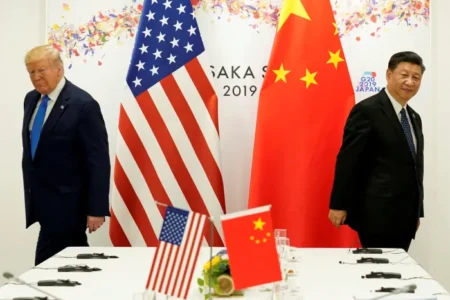Islamabad, Dec 17: Chinese leaders have agreed to increase the budget deficit to 4% of GDP for 2024, marking the highest level on record, while keeping the economic growth target at around 5%, according to two sources familiar with the matter.
The new deficit target contrasts with the initial 3% target for 2024 and aligns with a “more proactive” fiscal policy outlined by officials after the December Politburo meeting and the recent Central Economic Work Conference (CEWC), where these goals were discussed but not officially announced.
The increase of 1% of GDP in spending equates to roughly 1.3 trillion yuan ($179.4 billion). The additional stimulus will be funded through off-budget special bonds, the sources said, requesting anonymity because they were not authorized to speak publicly.
These targets are usually disclosed at the annual parliament session in March and could be subject to change before then.
China’s State Council Information Office and the finance ministry did not respond immediately to requests for comment from Reuters.
The increased fiscal spending is part of China’s strategy to counter the potential impact of higher U.S. tariffs on Chinese imports if Donald Trump returns to the White House in January. According to the sources, China will keep its GDP growth target of around 5% for 2025 unchanged.
A summary of the CEWC meeting released by state media emphasized the importance of maintaining steady economic growth, raising the fiscal deficit ratio, and issuing more government debt in 2024, but did not provide specific numbers.
Reuters reported last month that government advisors had suggested that China should avoid lowering its growth target.
This year, China’s economy has struggled, impacted by a severe property crisis, high local government debt, and weak consumer demand. Exports, one of the few bright spots, could soon face tariffs of more than 60% if Trump follows through on his campaign promises.
The prospect of these tariffs has unsettled China’s industrial sector, which exports more than $400 billion annually to the U.S. Many manufacturers are shifting production abroad to avoid the tariffs, and exporters warn that the levies will further reduce profits, hurting jobs, investment, and economic growth, and exacerbating China’s industrial overcapacity and deflationary pressures.
The CEWC and Politburo meetings also indicated that China’s central bank would adopt a “loosely appropriate” monetary policy stance, raising expectations for more interest rate cuts and liquidity injections.
China’s central bank had maintained a “prudent” stance over the past 14 years, during which time total debt, including government, household, and corporate debt, grew more than fivefold, while the economy tripled in size.
Analysts suggest that China will rely significantly on fiscal stimulus next year, but may also consider other measures to mitigate the impact of U.S. tariffs. Reuters reported last week that Chinese policymakers are contemplating allowing the yuan to weaken in 2024 to offset the effects of these punitive trade measures.
The CEWC summary reaffirmed China’s commitment to maintaining the basic stability of the exchange rate at a reasonable and balanced level, a pledge echoed in the summaries from 2022 and 2023.
